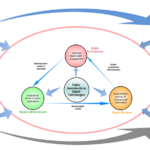Following on a previous request from KSA, I received a follow-up question from the Project Manager in Riyadh. The question was: how to prepare structures to support OSS development industry in the Kingdom?”
Here is what I sent back to the Kingdom.
1. It is essential to understand that we are talking about an ecosystem here. In such ecosystem government, the private sector and the open source community have a role to play in which they are both interdependent and autonomous at the same time.
2. Government has two key roles to play: First, to set policies that allow FOSS to flourish as a viable option in the local context and without having to necessarily mandate its use in government institutions. This is what Brazil did for example. Policies should not just be limited to FOSS per se but also relate to both R&D and incubation of local enterprises and support of local entrepreneurs. All these should be connected by on single long term objective: become an autonomous producer of knowledge products and services that can compete at the international level while fostering at the same time local markers and local development.
3. Secondly, and bearing in mind that in most developing countries governments are the largest buyers of products and services, procurement of of good and services by public institutions should also allow for the procurement of FOSS products and services on equal footing as those from proprietary vendors. Only in this fashion we can grow a local FOSS industry in a sustainable basis and both new enterprises and jobs will be created.
4. The local private sector must be an active partner in these efforts. In most countries, software companies are quite diverse and we usually find a mix of a few large large ones living side by side with a plethora of small companies and even a few non-profits. This is specially true when we consider FOSS. Local software associations can for example be instrumental here, specially if they can manage to also represent the interest of small FOSS companies striving to make a dent in the local
software market.
5. FOSS communities also need to come in as strategic partners of government implementation of FOSS in public institutions. While FOSS communities can be relatively small, their modus operandi can be introduced into government circles thus creating a public sector FOSS community that can breed innovation while enhancing the efficiency and effectiveness of the public sector. Communities in government are key for example to ensure that software can be shared an reused across government departments while at the same time increasing the ownership of the process by spreading responsibilities and stakes within government. This is yet another piece for the long term sustainability of FOSS in the public sector, and one that links to the overall
ecosystem and a cadre of FOSS entrepreneurs can also emerge from government institutions.
6. In short, what is needed is an integrated approach that focuses not on FOSS per se -as, after all, FOSS in just a means to an end, but on a tightly built ecosystem where innovation, R&D and technological independence are the real goals.
Cheers, Raúl





